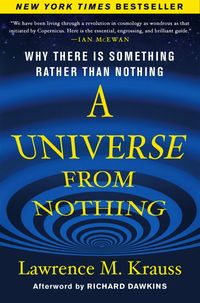Review: A Universe from Nothingby Jeff Foust
|
| Quantum gravity allows the formation of the universes (yes, plural) from the absence of space and time; in fact, he goes on, the formation of universes might be inevitable given the unstable nature of that “nothing”. |
Cosmologist Lawrence Krauss attempts to tackle the latter issue—the why, not the how, of our cosmic origins—in A Universe from Nothing. To answer the why, though, you have to understand the how, and Krauss covers this in the first part of the book. He reviews the development of the Big Bang model and the various discoveries that have shaped our understanding of both the origin of the universe and its potential fate. This part of the book is a fast-paced look at inflation, dark matter, dark energy, and related topics. In fact, the book might be a little too fast-paced: the causal reader runs the risk of getting bogged down on concepts like vacuum energy and negative pressure that are not intuitive.
With this grounding in the how of the universe’s formation, he then tackles the why. The Big Bang, he notes, has been embraced by some religions—it was endorsed by the Pope decades ago, for example—because it appears consistent with their creation stories. Krauss, though, argues that the Big Bang doesn’t imply, or require, the presence of any kind of supernatural creator. The universe could arise from “nothing”, he explains: quantum gravity allows the formation of the universes (yes, plural) from the absence of space and time; in fact, he goes on, the formation of universes might be inevitable given the unstable nature of that “nothing”. No creator or other precipitating event is required, and there may well be multiple universes with different physical constants—which could explain why the constants of this universe seem fine-tuned to allow the formation of galaxies, stars, planets, and life.
A Universe from Nothing, with its explanation of how the universe could come into existence without the need of a god or gods, will appeal to certain audiences, particularly the skeptical community (Richard Dawkins provides an afterword for the book, and Krauss notes that he had asked Christopher Hitchens to pen a foreword, but he fell ill and passed away shortly before the book’s publication.) Whether it will gain traction with the general public is another question, particularly since it requires some willingness to delve into the details of cutting-edge cosmology. Those who do persevere, though, will find an interesting and compelling argument that not only did our universe originate in the Big Bang, but that event may have been an inevitable consequence of physics, not theology.
